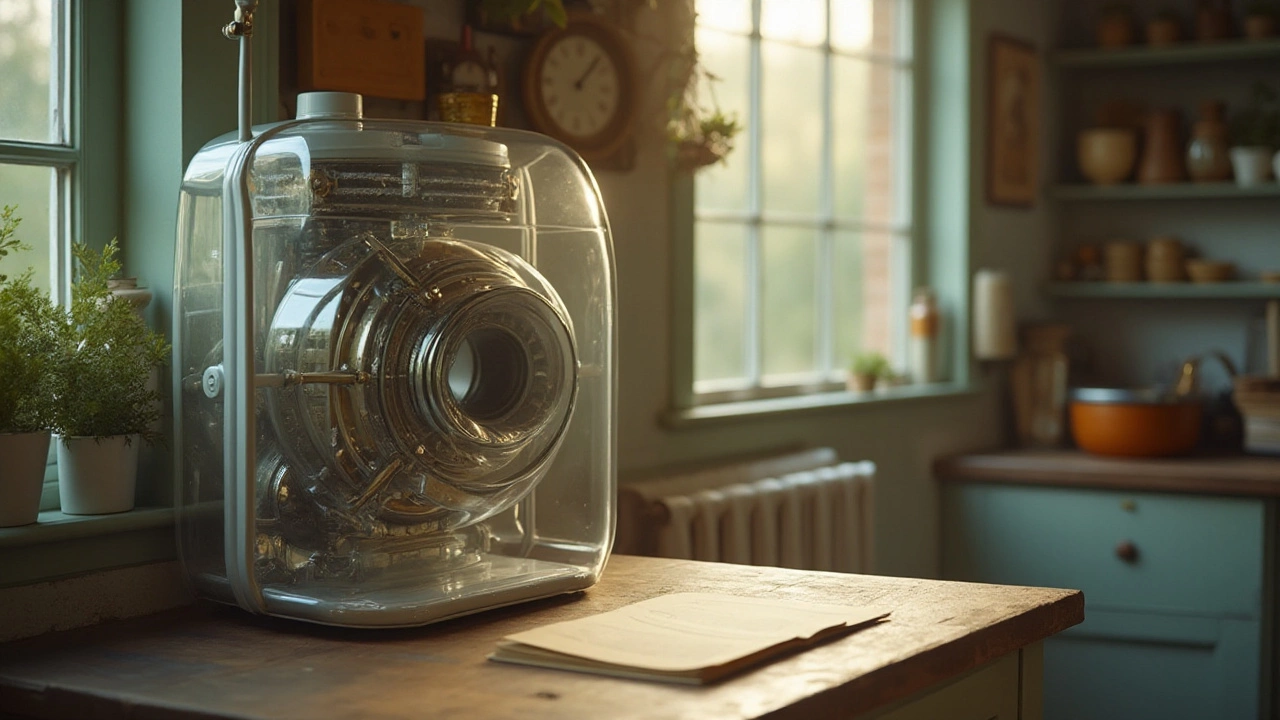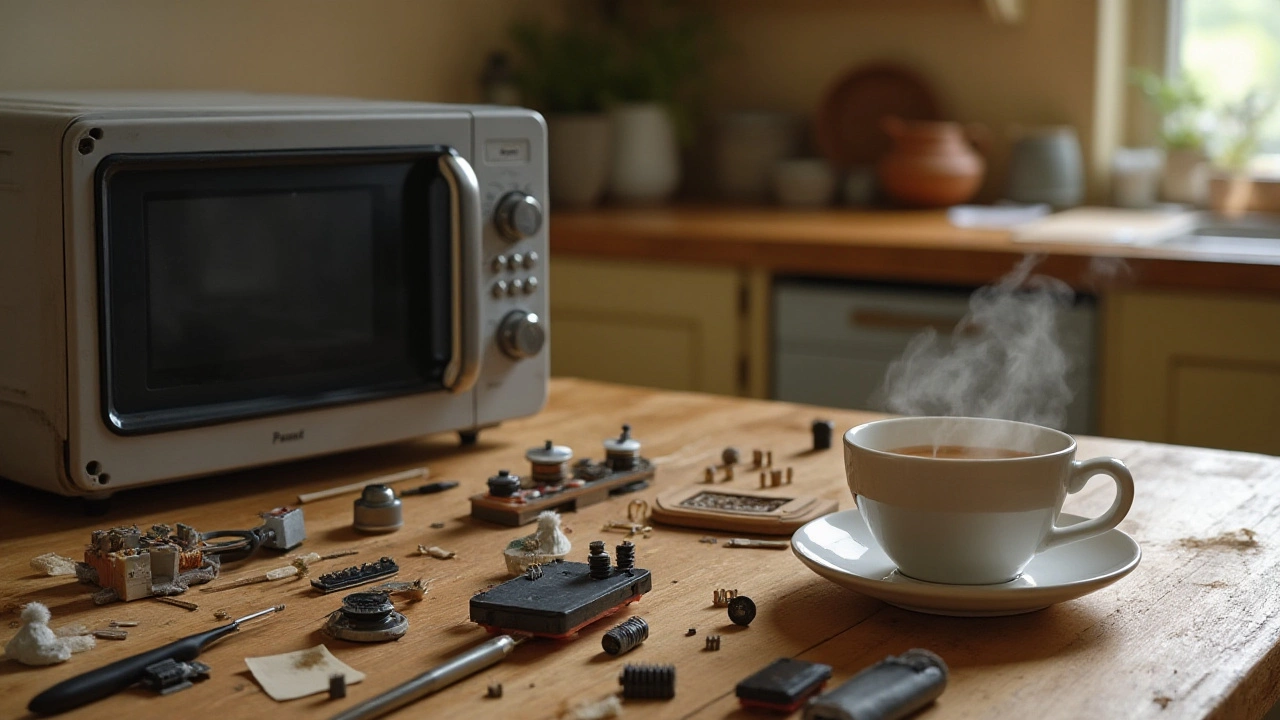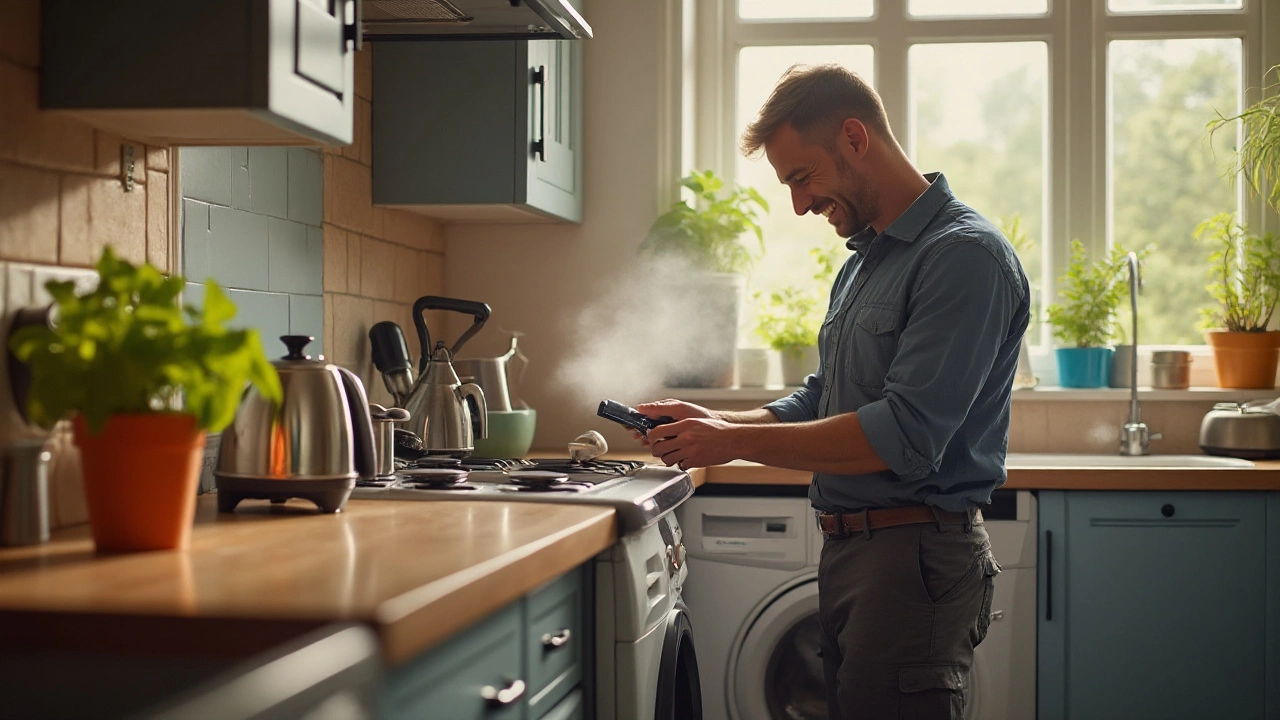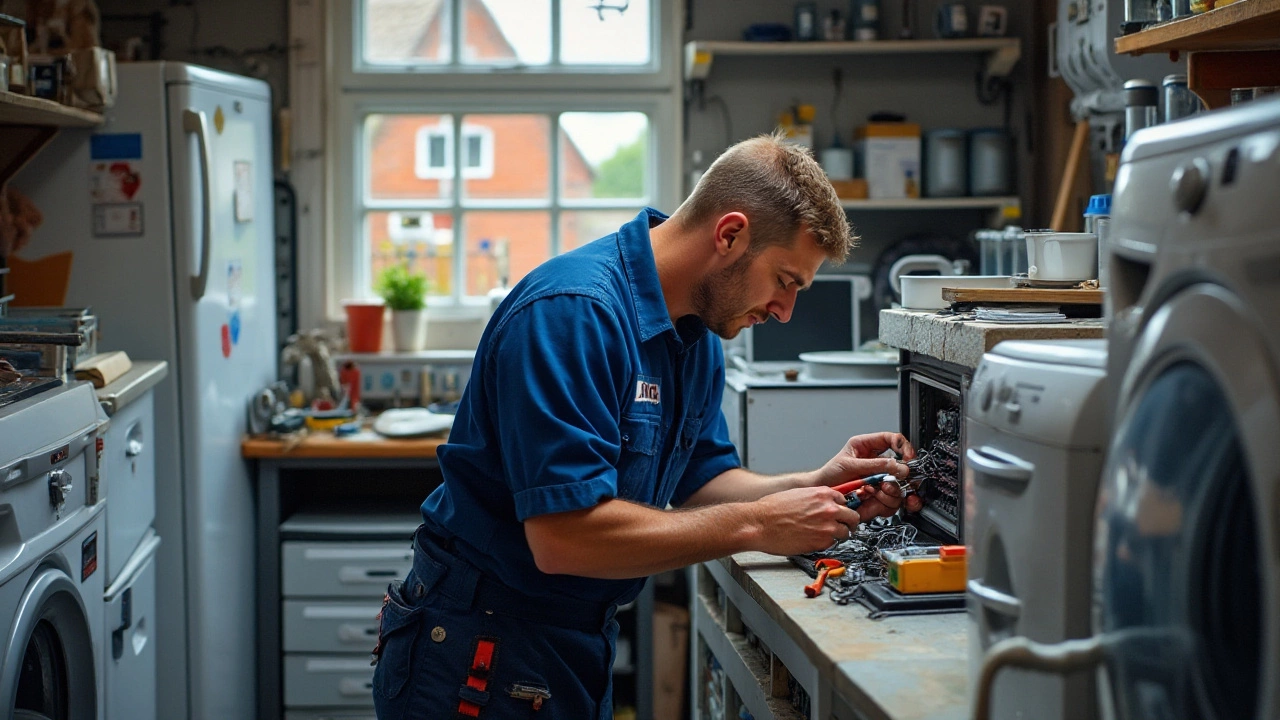
- 24 Nov 2024
- Gideon Thornton
- 0
In every corner of the modern home, appliances tirelessly hum, spin, and beep, making our lives remarkably convenient. Yet, beneath their smooth surfaces and sleek designs lies a fascinating world of complex mechanics.
The kitchen and laundry room gadgets you depend upon every day have intricate systems working to perform their tasks efficiently. Understanding these systems can be enlightening and sometimes even empowering, enabling you to troubleshoot minor issues yourself.
Arming yourself with this knowledge isn't just about saving a few dollars on repair bills. It's about demystifying the mechanical marvels of appliance technology, allowing a deeper appreciation of the innovations we often take for granted. In this exploration, we'll uncover tips to keep your appliances running smoothly while knowing the limits of DIY repair.
- The Science Behind Appliances
- Common Appliance Issues
- DIY Maintenance Tips
- When to Call a Professional
The Science Behind Appliances
The world inside a household appliance is a symphony of engineering and design, where each component harmoniously plays its part. Take a humble washing machine as an example. At its heart is the motor, the powerhouse that converts electrical energy into mechanical motion. This energy is transferred to the drum through a system of belts and pulleys, much like an automobile's transmission, allowing it to rotate at variable speeds. Most washing machines employ an agitator, or a pulsator in newer models, to gently coax clothes through water and detergent, ensuring a thorough clean while protecting delicate fabrics.
Refrigerators, the silent sentinels, rely on the remarkable physics of the refrigeration cycle to keep your food fresh. Using a refrigerant fluid that alternates between gaseous and liquid states, the cycle begins in the compressor, where the refrigerant is squeezed into a high-pressure gas. As it travels through the condenser coils at the back or bottom of the fridge, it dissipates heat and condenses into a liquid. The evaporator coils inside release the pressure, causing the refrigerant to evaporate and absorb heat, cooling the interior down to your desired temperature. This ingenious cycle is continuous, maintaining an optimal environment for food preservation from farm to fork. Appliance repair technicians often look at these cycles to pinpoint issues efficiently.
"The elegance of household appliances lies in their simplicity and reliability," says Dr. Jane Smith, a noted mechanical engineer specializing in consumer product design. "These machines have evolved but still adhere to fundamental physical principles, making them remarkably robust and efficient."
The microwave oven is another ubiquitous marvel, using electromagnetic radiation to vibrate water molecules within food, generating heat quickly. A magnetron, a device invented during World War II for radar technology, produces these microwaves, redirecting them through a waveguide and into the cooking chamber. Through reflection and absorption, food cooks evenly and swiftly, making meal preparation both convenient and fast. Interestingly, the rotational feature of turntables inside microwaves is not solely for even cooking but also addresses wave interference that could create hot and cold spots in the food.
Turning to dishwashers, they employ an intricate dance of physics and chemistry. Water is heated to about 130-140 degrees Fahrenheit and sprayed forcefully over dishes. Modern dishwashers use sensors to detect turbidity in the water, optimizing wash cycles for energy savings. Enzymatic detergents break down food residues, while rinse aids facilitate drying by ensuring water shears off surfaces. The mechanical water dynamics in tandem with chemical cleaners ensure hygienic results. Within all these appliances, sensors, whether for temperature, pressure, or motion, play crucial roles, providing feedback to electronic control units that optimize performance and ensure safety.

Common Appliance Issues
Household appliances have become essential in our daily routines, but they aren't immune to problems that can disrupt their performance. One of the most frequent issues people face is with the washing machine. It may start making unusual noises, an annoying sign that something is off. The culprit could be an unbalanced load or, in more serious cases, worn-out bearings. These components bear the brunt of spinning heavy loads and can wear out over time, leading to a costly replacement if not addressed promptly.
The bane of the modern kitchen, a refrigerator that won't cool, is another common headache. This could result from a malfunctioning compressor or a faulty thermostat. Sometimes, a simple clean-up of the condenser coils can revive a struggling system. Moving on to the stove, electrical stovetops can face burner issues, where a burner either refuses to heat or remains perpetually hot. Often, the solution lies in replacing a malfunctioning infinite switch, a relatively simple task for those a bit handy around the house.
In addition to mechanical failures, electrical issues can also pose significant challenges. Faulty heating elements in ovens and clothes dryers can prevent them from reaching the necessary temperatures, frustrating those who rely on them daily. The microwave, another kitchen staple, can fall victim to a broken diode or capacitor, causing the appliance to lose its heating ability.
And let's not forget dishwashers that leave dishes less than spotless. This issue might be due to clogs in the spray arms or the inlet valve, essential for allowing water to circulate efficiently. Repeated encounters with these issues underscore the importance of regular appliance maintenance as a preventive measure.
"An ounce of prevention is worth a pound of cure," says Neil T. Jones, a renowned appliance repair expert.
Recognizing these common problems and addressing them early can save both significant stress and expenses. Understanding the functioning and potential pitfalls of each appliance can empower homeowners to make informed decisions about when a DIY fix is appropriate and when it's time to enlist professional help. This knowledge not only leads to a smoother-running home but also extends the lifespan of each appliance, ultimately offering you the best value for your investment in modern conveniences.

DIY Maintenance Tips
Taking proactive measures to maintain your household appliances can be a game changer in extending their lifespan and ensuring they operate efficiently. Many appliance issues that might seem daunting at first glance can often be tackled with simple, regular maintenance practices. Understanding these methods doesn't just save money; it cultivates a sense of independence and confidence in handling domestic repairs.
Let's start with the washing machine, a staple in every home. Over time, washing machines can accumulate residues from detergents, minerals from hard water, and fabric softeners, potentially leading to unpleasant odors or reduced performance. To keep it fresh, run an empty cycle with hot water and two cups of white vinegar once a month. This simple step helps break down built-up grime and maintains the machine's efficiency. Additionally, always remember to leave the door open after each wash to allow residual moisture to escape, reducing the likelihood of mold and mildew.
Refrigerators need their share of attention too. Ensuring the condenser coils at the back or bottom of the unit are clean can vastly improve their efficiency. Dust and pet hair can insulate these coils, forcing the refrigerator to work harder and consume more energy. Unplug the fridge, and use a vacuum cleaner or a coil brush to keep these coils free from debris every six months. A clean refrigerator is not only about energy efficiency but also about maintaining food freshness and safety.
The microwave oven is an appliance that sees daily use and, as a consequence, can often end up looking worse for wear. To tackle grease and odor, fill a microwave-safe bowl with water and a splash of lemon juice, and heat it until the water boils. The steam helps loosen grime, making it easy to wipe away with a soft cloth. This trick is both effective and surprisingly easy, ensuring your microwave stays fresh inside and out.
Routine Checks and Measures
Kitchen stoves and ovens also benefit from regular maintenance. For electric stoves, occasionally check the coils and elements for any damage or signs of wear. If you notice any spots where the coil has fused, it's a clear sign to replace them. For ovens, ensuring the door closes tightly by checking the rubber gasket for cracks or damage is essential. This not only ensures even cooking but also conserves energy.According to the Appliance Maintenance Program by McGill University, "Regularly replacing water filters, cleaning exhaust fans and ensuring proper ventilation can significantly enhance the performance and longevity of household appliances."
Finally, for all appliances, ensure you're regularly checking and replacing filters and vents. Whether it's a dishwasher, air conditioner, or vacuum cleaner, the efficiency often hinges on how freely air and water can flow through these components. Clogged filters or vents can drastically affect performance, leading to large energy bills and even appliance failure.
Engaging in DIY maintenance might initially feel like a chore, but with practice, it becomes second nature. The immediate benefits, such as improved performance and energy savings, are tangible rewards. Moreover, establishing a routine maintenance schedule can prevent potential breakdowns, saving untold amounts of money and time in service calls. Remember, understanding and implementing these strategies empowers you not just as a homeowner but as a steward of your daily environment.

When to Call a Professional
Even the most seasoned DIY enthusiast will face situations where calling a professional is the smartest option. While many minor repairs and regular maintenance tasks can be handled at home, certain circumstances require the expertise of a trained technician. Complex electrical or natural gas issues are clear examples of when professional intervention is non-negotiable. Attempting to fix such problems without the right know-how can lead to significant hazards, including the risk of personal injury and property damage. With appliances becoming increasingly sophisticated, equipped with computer-driven systems and advanced sensors, it's crucial to understand your limits when it comes to repair work.
Another factor to consider is the potential voiding of warranties. Many appliance manufacturers stipulate that warranties remain valid only when repairs are performed by certified technicians. Taking matters into your own hands could nullify the warranty, leading to steeper costs if future issues arise. Additionally, modern appliances often require specialized tools or replacement parts that aren't readily available to the general public. A professional has access to these resources, ensuring that repairs are conducted correctly and efficiently. Jay Steinhauer, an appliance service expert, once said,
"Knowing when to step back and call in a pro isn't an admission of defeat—it's a strategy for ensuring the job's done right."
Financially speaking, there are scenarios where DIY repairs can end up being more costly than hiring a professional. Misdiagnosing a problem or using improper repair techniques can cause more damage, escalating the issue. A licensed technician, with a wealth of experience and an eye for detail, can quickly pinpoint root problems and offer cost-effective solutions. According to a recent survey, approximately 30% of DIY appliance fixes eventually require professional intervention. This statistic underscores the reality that sometimes, a direct route to professional assistance saves both time and money.
Lastly, consider the time factor. While tackling a repair job yourself can be fulfilling, it can also be time-consuming, especially if you're unfamiliar with the appliance's inner workings. For busy individuals who have numerous commitments, dedicating countless hours to troubleshooting and repair may not be feasible. Professionals not only bring expertise but also the efficiency necessary to get the job done swiftly. Knowing the signs of when to call a professional, such as repeated failures after attempted fixes, strange noises, or lingering safety concerns, is essential for effective appliance management.




